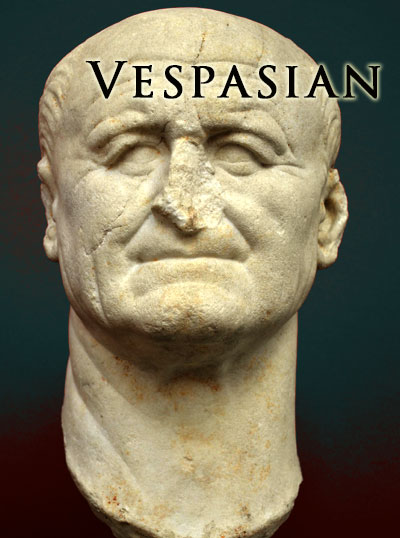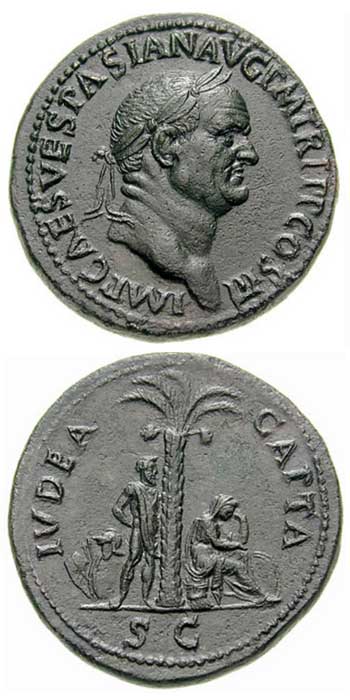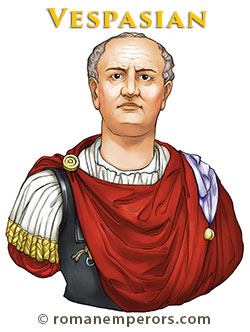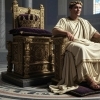Roman Emperor Vespasian
69 - 79 A.D.
Titus Flavius Caesar Vespasianus Augustus
Busts, Statues, Coins, Information, Maps, Images, and More

From Humble Beginnings to Flavian Glory: The Reign of Emperor Vespasian
Titus Flavius Vespasianus, or Vespasian as he's more commonly known, stands as a towering figure in Roman history. A self-made man who rose from humble origins to become emperor, his reign (69-79 AD) marked a period of remarkable restoration and stability after a tumultuous year known as the Year of the Four Emperors.
Early Life and Military Accolades
Born in 9 AD in a small town near Rome, Vespasian's background differed significantly from the traditional aristocratic lineage of most emperors. His father, Titus Flavius Sabinus, was a tax collector, a profession not exactly revered in Roman society. Despite this, Vespasian received a decent education and embarked on a military career, showcasing his talent and ambition early on.
His service in Britain during the Roman invasion (43 AD) garnered him recognition and promotions. He later distinguished himself in campaigns throughout the empire, culminating in his appointment as legate in Judea in 66 AD.
The Jewish Rebellion and the Rise to Power
Judea, a simmering pot of religious and political tensions, erupted in rebellion against Roman rule in 66 AD. Vespasian, a skilled commander, was tasked with quelling the uprising. The war proved brutal and protracted, dragging on for several years.
Meanwhile, back in Rome, the political landscape was fracturing. Emperor Nero's suicide in 68 AD plunged the empire into chaos, with four emperors claiming the throne in rapid succession (Galba, Otho, Vitellius). Recognizing the opportunity, Vespasian's legions in Judea declared him emperor in 69 AD.
A Brutal Civil War and Unification
Vespasian, however, faced a significant challenge – Vitellius controlled Rome and much of the western empire. A brutal civil war ensued, culminating in the defeat of Vitellius' forces at the Second Battle of Bedriacum in 69 AD. With his rival eliminated, Vespasian entered Rome and was officially recognized as emperor by the Senate in December of that year.
Reconstruction and Reform
Vespasian's primary task upon becoming emperor was to restore order and stability to a fractured empire. The civil war had depleted the treasury, and rebellions simmered in various provinces. Vespasian, known for his pragmatism and efficiency, tackled these challenges head-on.
He implemented a series of fiscal reforms, including a notorious tax on public urinals – a move that earned him derision but significantly bolstered the treasury. He also streamlined bureaucracy, strengthened the military, and cracked down on corruption. His efforts, though unpopular at times, proved effective in rebuilding the empire's financial and military strength.
A Legacy of Building Projects and Patronage
Beyond restoration, Vespasian's reign was marked by a period of significant building projects. The Colosseum, initiated by his predecessor Nero, was completed under his rule. He also oversaw the construction of the Temple of Peace, a monument celebrating the restored peace within the empire. These grand projects not only provided jobs and stimulated the economy but also served as lasting symbols of his reign.
A Leader of Pragmatism and Compassion
Vespasian, despite his humble origins, never forgot the importance of public image. He cultivated a reputation for wit and pragmatism. The famous quote attributed to him, "money doesn't smell," exemplifies his practical approach to governance. While some criticized his methods, his focus on stability and prosperity resonated with the Roman populace.
A Dynasty Founded
Perhaps Vespasian's most enduring legacy lies in his role as the founder of the Flavian dynasty. He ensured a smooth succession by grooming his son Titus as his heir, paving the way for a period of relative stability and prosperity for the empire.
A Controversial Legacy but an Undisputed Impact
Vespasian's reign was not without controversy. The brutal suppression of the Jewish rebellion and his sometimes ruthless tactics tarnished his image for some. However, his achievements in restoring stability, reviving the economy, and initiating a new dynasty cannot be denied.
Vespasian's story serves as a testament to the power of ambition, pragmatism, and effective leadership. He rose from obscurity to become a pivotal figure in Roman history, leaving behind a legacy that transcended his humble beginnings.

More to Come

"Flavius"
Vespasian was the last in the "Year of the Four Emperors" and the first of the Flavian Emperors. He was married to Flavia Domitilla and they had a daughter and two sons, Titus and Domitian, and both became emperors. Vespasian was a seasoned battle commander who rose in the ranks of the Roman army. He served faithfully in Britain, and later the emperor Nero commissioned Vespasian to stamp out the rebellion by the Jews in Judaea in 66 A.D. He brought two legions (5th and 10th) and initiated the siege of Jerusalem, but when Nero committed suicide he charged Titus to finish the task, and Titus brought a legion with him (the 15th)to finish the war against the Jews. Vespasian was focused on returning to Rome and defeating and killing Vitellius and restoring order in Rome, after Nero had so squandered the cities wealth. Vespasian was a strong emperor and ruled favorably in Rome for 10 years, until he complained of a great pain in his bowels. He died at the age of 70 and the whole empire mourned his death. Vespasian founded the Flavian Dynasty and this opened a new chapter in Roman history.

















Latest




Popular




Useful




